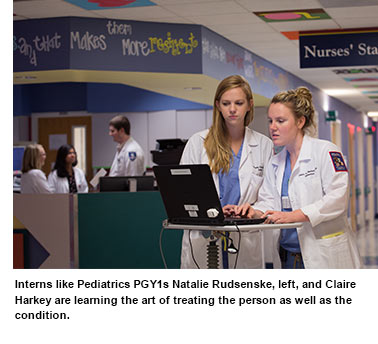Caring Begins with Curiosity
Good morning!
I want to start by officially welcoming all the new residents who have joined UMMC this summer – some our own graduates, some completely new to Jackson. I’ve encountered some of you in meetings and hallways, and I look forward to seeing more of you as the year goes on.
 We’re still in that time of beginnings and endings, as learners transition from one phase of their education to the next. So today I want to talk about a graduation speech I read that really hit home for me.
We’re still in that time of beginnings and endings, as learners transition from one phase of their education to the next. So today I want to talk about a graduation speech I read that really hit home for me.
Dr. Atul Gawande is, I’m sure, familiar to many of you. A surgeon and public health researcher at the Brigham and Women’s Hospital in Boston, he is also an acclaimed author and one of the foremost thinkers and commenters on medicine and health care today.
Last month, Dr. Gawande delivered the commencement address at UCLA Medical School in Los Angeles. The full text of his remarks were reprinted in the New Yorker magazine, to which he is a regular contributor.
In his speech, Dr. Gawande recounted his experience as a third-year medical student on a surgery rotation. One night he accompanied the chief resident to the emergency department to attend to a prisoner who had swallowed a razor blade and had also managed to slash his wrist with the corner of a toothpaste tube, presumably to get out of prison for a few hours.
As anybody who has spent any time in the ED knows, it represents a microcosm of our society – the good, the bad and the ugly. The prisoner that Dr. Gawande encountered was definitely not in the “good” category.
“The first thing out of his mouth was a creepy comment about the chief resident, an Asian-American woman,” recalled Dr. Gawande. “I won’t say what he said. Just know he managed in only a few words to be racist, sexist and utterly menacing to her. She turned on her heels, handed me the clipboard and said, ‘He’s all yours.’”
It’s at that point in his story that Dr. Gawande injected the idea that is at the heart of his speech, and that we as providers of health care can never forget.
“Graduates, wherever you go from here, and whatever you do, you will be tested. And the test will be your ability to hold onto your principles. The foundational principle of medicine, going back centuries, is that all lives are of equal worth.”
And yet, we all know that throughout our history, there has been a gap between that aspirational principle and reality. It turns out that, as Dr. Gawande said, “some people get worse or no treatment because of their lack of money, lack of connections, background, darker skin pigment or an additional X chromosome.”
To make matters worse, some of our patients can make it awfully hard on us as caregivers by their own behavior. “In medicine, you see people who are troublesome in every way: the complainer, the person with the unfriendly tone, the unwitting bigot, the guy who, as they say, ‘makes poor life choices.’ People can be untrustworthy, even scary.”
The challenge, Dr. Gawande said, is to look beyond all of these factors of identity and behavior and recognize each person as having a common core of humanity. That requires a willingness “to climb into someone else’s skin and walk around in it,” as Atticus Finch reminded us in “To Kill a Mockingbird.”
Following that sage advice can be daunting when the patient in front of you is so different from you or is behaving badly. It can require getting out of your comfort zone. It can require courage. At a minimum, says Dr. Gawande, it requires a certain curiosity about others.
“Among the most important capacities that you take with you today is your curiosity,” Dr. Gawande told the graduates. “You must guard it, for curiosity is the beginning of empathy.”
He added: “Once we lose the desire to understand – to be surprised, to listen and bear witness – we lose our humanity.”
How did it work out with the prisoner? His injuries turned out to be relatively minor, requiring Dr. Gawande to spend an hour suturing the lacerations on his forearm. As he worked, he made a conscious effort to not react to the prisoner’s insults, but to listen to his emotions. As he genuinely listened and “attended” to the patient, the prisoner calmed down and became more civil.
“I didn’t understand him or like him. But all it took to see his humanity – to be able to treat him – was to supply that tiny bit of openness and curiosity.”
Dr. Gawande concluded with these words to the UCLA graduates: “You will be given trust to see human beings at their most vulnerable and to serve them. That trust is earned because of your values, your commitment to serving all as equals, and your openness to people’s humanity.”
Dr. Gawande’s insights, always elegantly expressed, are worth noting and remembering as we all work to achieve A Healthier Mississippi.



